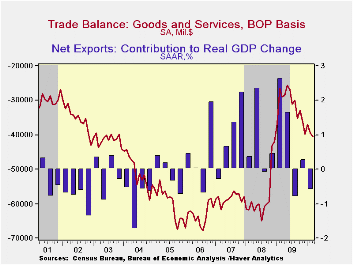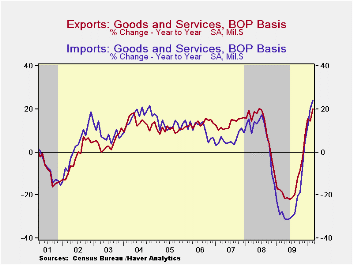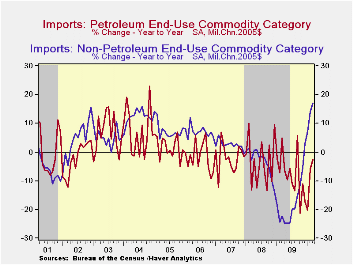 Global| May 12 2010
Global| May 12 2010U.S. Trade Deficit Deepens With Higher Oil Prices & Economic Recovery
by:Tom Moeller
|in:Economy in Brief
Summary
After stabilizing a bit for a few months, the U.S. foreign trade deficit broke from its range and deepened in March. The deficit of $40.4B compared to a little-revised $39.4B during February. The latest figure roughly matched [...]

After stabilizing a bit for a few months, the U.S. foreign trade deficit broke from its range and deepened in March. The deficit of $40.4B compared to a little-revised $39.4B during February. The latest figure roughly matched Consensus expectations for a deficit of $40.0B. Nevertheless, the latest deficit was the deepest since December of 2008.
Both imports and exports were strong during March. The 3.1% increase in total imports reflected a 10.0% increase (72.4% y/y) in imports of petroleum products as crude oil prices rose m/m to $74.32 per barrel. The economic recovery in the U.S. also caused the quantity of petroleum imports to jump 7.4% m/m, even though the level remains down 2.5% y/y following declines during the prior several years.
Non-oil imports again reflected the economic recovery with a 2.6% gain which was the seventh solid increase in the last nine months. These gains followed a 17.7% decline for all of last year. The increase has been led by imports of automotive vehicles & parts which surged by nearly two-thirds y/y. Real nonauto consumer goods imports rose another 1.1% m/m (9.1% y/y) and capital goods imports jumped 1.2% m/m (16.7% y/y). Finally, services imports slipped 1.3% (+9.1% y/y). U.S. travels abroad increased 1.1% (4.5% y/y) while passenger fares surged 4.8% (5.6% y/y). "Other" transportation services imports jumped for the seventh consecutive month, posting a 3.8% increase (18.1% y/y).
Nominal exports jumped 3.2% (20.4% y/y) due to a 3.4% surge (16.9% y/y) in real merchandise exports. That was the strongest y/y gain since 1997. Real exports of non-auto consumer goods led the strength with a 5.7% jump (11.0% y/y). Real capital goods exports followed with a 1.2% gain (10.8% y/y) and auto exports nudged up by 0.4% (53.5% y/y). Exports of services rose 0.9% (11.9% y/y) with a 12.8% y/y gain in travel.
By country, the trade deficit with mainland China held roughly stable at $16.9B, roughly half its peak of $27.9B in October of 2008. Trade with China surged as exports jumped by roughly 33% y/y and imports rose by a lesser 14.7%. With Japan, the trade deficit deepened to $5.2B as imports surged by roughly 50%, due to the U.S. economic recovery, and exports rose 14.6% y/y. With the European Union, the trade deficit increased to $7.1B as exports rose 6.0% y/y but imports from Europe surged 15.8%.


| Foreign Trade | March | February | January | Y/Y | 2009 | 2008 | 2007 |
|---|---|---|---|---|---|---|---|
| U.S. Trade Deficit | $40.4B | $39.4B | $37.0B | $28.8B (3/09) | $378.6B | $695.9B | $701.4B |
| Exports - Goods & Services (m/m) | 3.2% | 0.3% | -0.2% | 20.4% | -14.9% | 11.2% | 13.2% |
| Imports - Goods & Services | 3.1 | 1.6 | -1.8 | 24.2 | -23.4 | 7.6 | 6.0 |
| Petroleum | 10.0 | 1.9 | -3.6 | 72.4 | -44.1 | 37.0 | 9.4 |
| Nonpetroleum Goods | 2.6 | 1.1 | -1.8 | 20.4 | -21.0 | 1.5 | 4.8 |
Tom Moeller
AuthorMore in Author Profile »Prior to joining Haver Analytics in 2000, Mr. Moeller worked as the Economist at Chancellor Capital Management from 1985 to 1999. There, he developed comprehensive economic forecasts and interpreted economic data for equity and fixed income portfolio managers. Also at Chancellor, Mr. Moeller worked as an equity analyst and was responsible for researching and rating companies in the economically sensitive automobile and housing industries for investment in Chancellor’s equity portfolio. Prior to joining Chancellor, Mr. Moeller was an Economist at Citibank from 1979 to 1984. He also analyzed pricing behavior in the metals industry for the Council on Wage and Price Stability in Washington, D.C. In 1999, Mr. Moeller received the award for most accurate forecast from the Forecasters' Club of New York. From 1990 to 1992 he was President of the New York Association for Business Economists. Mr. Moeller earned an M.B.A. in Finance from Fordham University, where he graduated in 1987. He holds a Bachelor of Arts in Economics from George Washington University.
More Economy in Brief
 Global| Feb 05 2026
Global| Feb 05 2026Charts of the Week: Balanced Policy, Resilient Data and AI Narratives
by:Andrew Cates






